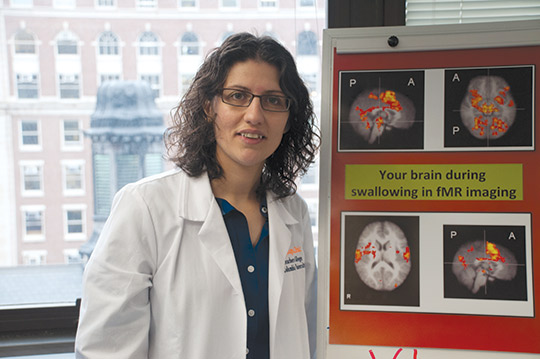At the Mysak Clinic, A Growing Emphasis on the Brain
TC’s clinic for communication disorders opened in the 1940s and was later named for speech pathologist Edward D. Mysak. Today, under the direction of Dr. Kathleen Youse and her assistant director, Elise Wagner, the Mysak Clinic spans a wide range of areas, of which swallowing – a function that employs many of the same muscles as speech – is the newest and smallest.
The clinic provides diagnostic and therapeutic services for a sliding-scale fee for children and adults with disorders of language, articulation, voice and fluency, as well as the problems associated with cleft palate, cerebral palsy, hearing loss, aphasia and other handicaps.
Under the close supervision of faculty members, every student in TC’s Speech-Language Pathology program, which includes those who participate in the new Dysphagia Research Clinic, does some clinical work at Mysak with clients referred by physicians or word of mouth.
The fields of both speech-language pathology and swallowing research have become more scientifically-based, particularly as more has become known about the role of the brain in speech and swallowing. Georgia Malandraki was hired at TC by John Saxman, who will step down in 2013 as Speech-Language Pathology program coordinator, because of her ability to introduce scientific methods and swallowing research into a mostly linguistically oriented program.
At the same time, however, Malandraki says she likes the interdisciplinary environment at TC, especially within the Biobehavioral Sciences Department, where Andrew Gordon, Peter Gordon, Tara McIsaac, Carol Ewing Garber and other faculty work at the nexus of the brain and body.
Malandraki also appreciates the opportunities to mine neurocognitive research being conducted at TC, most notably by the incoming Speech-Pathology program coordinator, Karen Froud, who runs the College’s Neurocognition of Language Lab.
“This is a great place to be,” Malandraki says, “because there are so many tools at your disposal and so many great minds at work on related problems.”
Published Friday, Dec. 7, 2012
